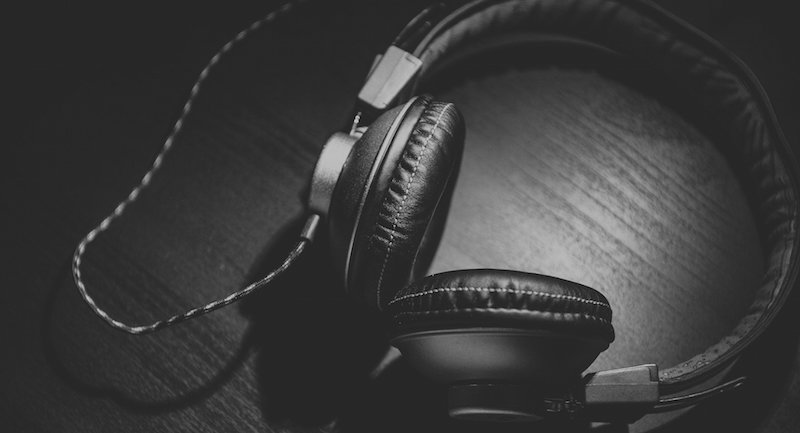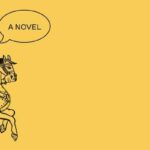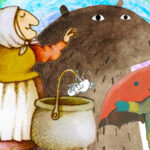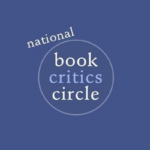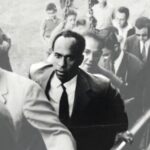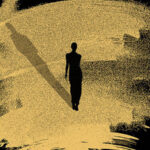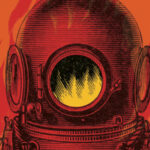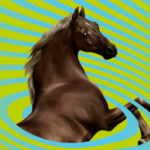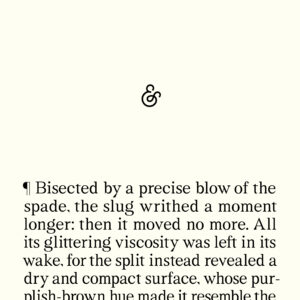All The Songs We Cannot Hear: On the Challenges of a Life Without Sound
Matt Hay Considers the Importance of Music for the Hearing Impaired
“Sweet dreams are made of this.”
–Eurythmics
*
If your life was made into a movie, or better yet, a multiple-episode limited series that people could stream whenever they liked, what would be the soundtrack? What music would set the pace and mood of your story? As the opening credits fell away and the first scene faded in—overhead shot of a car on a narrow, straight country road—what song would provide the overlay? Would you pick something like “Indiana” by the Samples—“I remember the first time I drove through Indiana/ Thinking to myself how big this land really is / Amber waves of grain, from a highway / Who lives in that house so far away?” Just guessing, but I would say, probably not. Still, the question remains: What lyrics would flood you with memories of your own, or ignite an emotion buried under the dormant embers of time?
I remember cruising in the passenger seat of Stephanie Lake’s Subaru on a summer evening in high school, many of my best friends packed around me singing Prince’s “7” to the road signs and cornstalks standing tall as we passed by. “No one in the universe will ever compare…”
Deafness is hard to describe because it’s impossible to simulate.I remember reclining at my fraternity house on a perfect, lazy Sunday afternoon in April watching the Masters golf tournament on mute with the windows open, Trey Anastasio of Phish extending an invite to “come waste your time with me.” I remember an overcast, bone-chilling February, the kind of Midwestern day that makes you think you live at the North Pole, when my college roommate and I decided that instead of going to class, we had to take a road trip south to New Orleans.
Neither of us had been to Mardi Gras. That was as good a time as any. We borrowed a car and mapped out a path, eleven hours and thirty-seven minutes, give or take time for gas stops and a meal or two. Not long after jumping on Highway 37, we realized we’d left the stocked CD case on the roof of the car, so we drove all those hours listening to Janis Joplin, the CD already in the car, confess that she’d “trade all her tomorrows for a single yesterday.”
Flash-forward to a night in Chicago with my roommates, having just one more drink while marveling at the tight California harmonies of Brian Wilson’s band. “I’m pickin’ up good vibrations.” Then zip ahead again to that moment on the way to the hospital for one of my surgeries, Bob Marley assuring me that “every little thing gonna be all right.”
Those nuggets of life represent a past that has built the present and will hopefully shape a small corner of the future.
For most people, the first lick or two of a song will trigger a memory like the ones I’ve just described, a warm shower of feelings linked to a lyric or a beat. Songs are like pages in a scrapbook, each igniting an emotion from the past. But when that person whose life is laid out in those pages can no longer hear—when the sounds that jar the memories slip away like a friend’s voice in a passing car—the scraps within the pages of that book suddenly stop. One page is filled with vivid recollections. The next is vacant and white, all the “misty watercolor memories / of the way we were” faded like photos in a ceaseless rain.
Deafness is hard to describe because it’s impossible to simulate. Ears don’t have eyelids. You can’t remove your auditory receptors for an hour or two just to experience what it’s like. Deafness is unique among the senses in that respect. If you want to know what it’s like to be without sight, you can put on a blindfold in the dark and bump into things for a while. You can also get a shot of Novocain and marvel at the weirdness that comes with losing your sense of touch.
If you have contracted a virus, there is a chance you lost your sense of taste or smell. Being deaf is different. You can simulate hearing loss easily enough. Put in earplugs and don a noise-canceling headset and you will muffle most sounds, but if lightning strikes a tree nearby, you are going to hear something. Even in your quietest moments, there are sounds: SUVs lumbering down your street, neighbors mowing their lawns, dogs barking, or the hint of a breeze rustling the Bradford pears around you.
Go indoors to the quietest place in your home, and you will still hear things: the patter of your own footsteps, the rasp of your own breath, or a late-morning growl from your stomach alerting you that it’s lunchtime. Even if you pause those bodily functions, you might still hear the hum of electricity pulsing through wires. The point is, no matter how quiet you make things, hearing people hear, which is great. However, that makes it harder to appreciate those who can’t.
Deafness remains foreign to most for good reason. Almost a million people in the United States can’t hear anything. Those are the people who, without an assist from technology, couldn’t hear a cowbell if you rang it behind them. That may seem like a big number, but in a country of 330 million, it’s far enough down the list that it’s reasonable to have never met anyone who is deaf.
It’s also worth noting that more than half of those who are completely deaf are over the age of sixty-five. That is quite different from “hearing loss,” which affects well over 466 million people worldwide, with the number continuing to rise. Hearing loss falls on a wide spectrum, and you know plenty of those people. It’s the guy in the office next door who has hearing aids that you never noticed until he pointed them out to you. It’s your mom who is tilting her head and saying, “What’d you say?” more often than she did a year ago.
It could be the girl on your daughter’s soccer team with a quarter-sized disc attached to the back of her head and a wire that runs somewhere. You’d love to know more about her, but it’s awkward to stare and scary to ask, so, like most people, you do nothing. All of them and many more live under the roof we label as “hearing loss.”
Like millions of people in the world today, I live on the edge of that roofline, a world where the promise of technology keeps hope alive while the frustrations of loss tap me in the shoulder like a steady rain.
Everyone who lives inside the hearing-loss community feels walled off and lost at times. There are the sounds, for example, that the totally deaf rarely hear no matter how advanced the technology. Even with the miracle of modern cochlear implants and other artificial hearing-enhancement devices, a deaf person has trouble with words that lack hard consonants. If it starts or ends with the tick of a T or has the kick of a K, it’s easier to fill in the blanks.
Throw out a soft, swirling sentence and, even with the best technology on the market, the sounds come out like a lullaby in a foreign language: lovely, earnest, and meaningless to the person on the receiving end. In one of the many ironies of hearing loss, a question like “How’s your hearing?” has no hard handles on which to grab. For many, it comes across as something like “awe ooh zee.”
Since no hearing person can relate to total deafness, living in a world where you can’t hear the soft snores of the person you love or the hard cheers of thousands for your favorite football team, try to ponder something simpler. I ask again: What would be your soundtrack?
I first pondered that question in my twenties, because I had to cope with the realization that I might never again experience the feelings of piling into a buddy’s Jeep while Glenn Frey went to his upper register telling me about “a peaceful easy feeling.” I created my soundtrack once Glenn and his bandmates began to fade like the light of a setting moon.
If the rest of your life had to be lived in silence, what sounds would you want to remember?My objective in telling this story is to help others find their own connections within the quiet places of life; to hopefully make you ponder the moments, the relationships, and the feelings you never want to forget. If the rest of your life had to be lived in silence, what sounds would you want to remember?
For me, it was everyday sounds like the high-pitched growl of a chain saw as it bit through the trunk of a poplar. I wanted to remember my mother’s voice calling us to dinner, and the folksy wisdom of my father, a woodshop teacher who gifted his homespun nuggets to my big brother and me growing up. I wanted the laughs of the ones I love to always be embedded in the folds of my mind.
And I wanted to remember music, the catchy hooks that stick around in the brain for decades, like the baritone beat of Waylon Jennings as I played in the driveway, riding my Big Wheel and spinning out. “Just some good ol’ boys / Never meanin’ no harm.” Dad would always holler at me (in southern Indiana, kids heard a lot more hollering than yelling, the former being a raised voice, the latter an angry one), because the Big Wheel left black streaks on the sidewalk.
I also needed to recall those moments in my youth when bad news marked a turning point, the feeling in the pit of my stomach when an otherwise quiet car ride was broken up by Bob Dylan knowing just the right words. “Tangled up in blue,” indeed.
Of course, there were first dates, first kisses, the first flutters of love seared into my brain with the Verve telling me, “It’s a bittersweet symphony, this life.”
Then there were the tender minutes a man has no words to describe. Can you imagine losing all memory of your own voice whispering a beautiful baby to sleep? “Blackbird singing in the dead of night / Take these broken wings and learn to fly…”
Those moments are more than a playlist: they represent the pieces of a life no one wants to lose. For those reasons, I set out to create a soundtrack of my life, a “Matt’s Greatest Hits”—not songs by me, but songs that connect me to moments I never want to forget.
Hearing loss is seen by most people as a physical disability, or “challenge,” as it’s known in the newest lexicon. There’s nothing wrong with being deaf. Deaf culture thrives throughout the world. People everywhere find fraternity in their shared, silent experiences. That just wasn’t my culture. Not only had I never met anyone who was deaf, the closest I even came to knowing anyone with hearing loss was my grandpa Earl, whose huge tan hearing aids remained unused and unmoved for a decade in the drawer next to the green rotary phone on his desk.
Even when my hearing wasn’t great, I felt comfortable in almost every room I entered. New people and things, new interactions; it was all like a movie where someone sees Las Vegas for the first time, wide-eyed and smiling. Fear of losing that connection proved to be a powerful motivator. My soundtrack was a way to “hold on loosely, but don’t let go.”
This is also a love story, one with an unexpected focus on the “in sickness and in health” part and a dash of “for better and for worse.”
There is a good chance that it is your story and your journey, too, whether or not you have all five of your senses. You don’t have to lose your hearing to feel like you’ve been dealt a bad hand. Staying a step ahead of the terrifying darkness taught me that you don’t always have to play the hand you’re dealt in life. Sure, sometimes you’ve got to “know when to hold ’em / and know when to fold ’em.”
But sometimes, in life, it’s okay to ask for new cards.
__________________________________
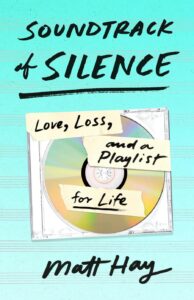
From Soundtrack of Silence: Love, Loss, and a Playlist for Life by Matt Hay. Copyright © 2024 by Matt Hay and reprinted with the permission of St. Martin’s Publishing Group, a division of Macmillan, Inc.

